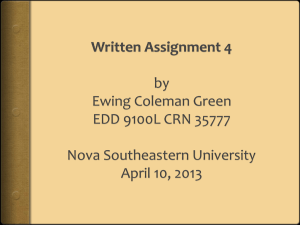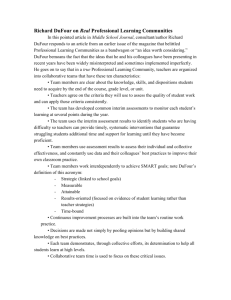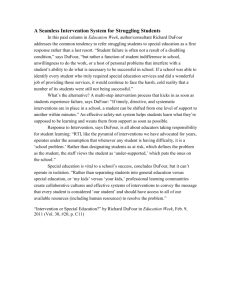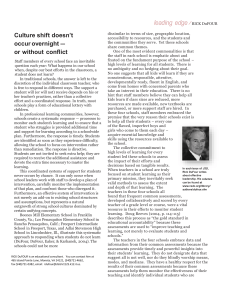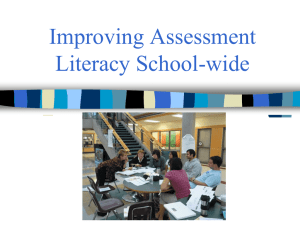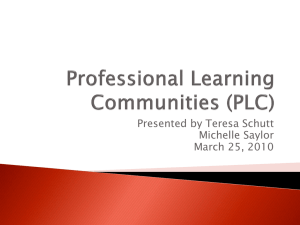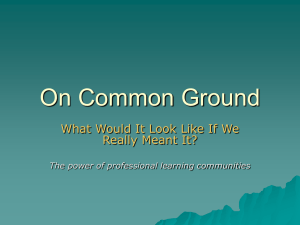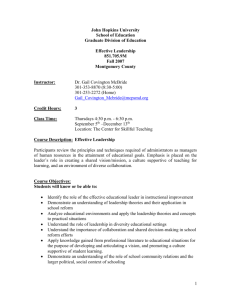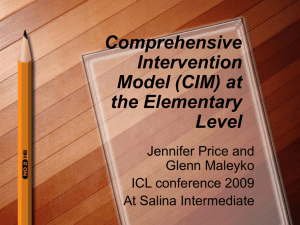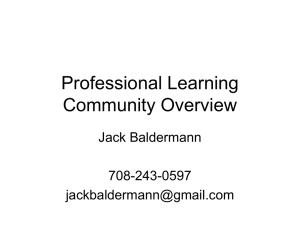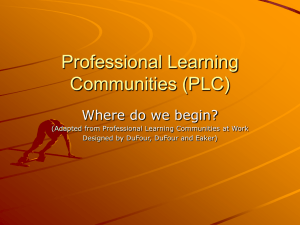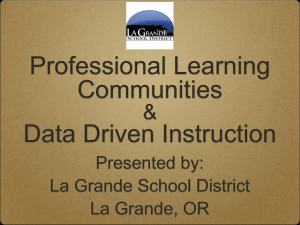Unpacking Standards Matching Assessments
advertisement
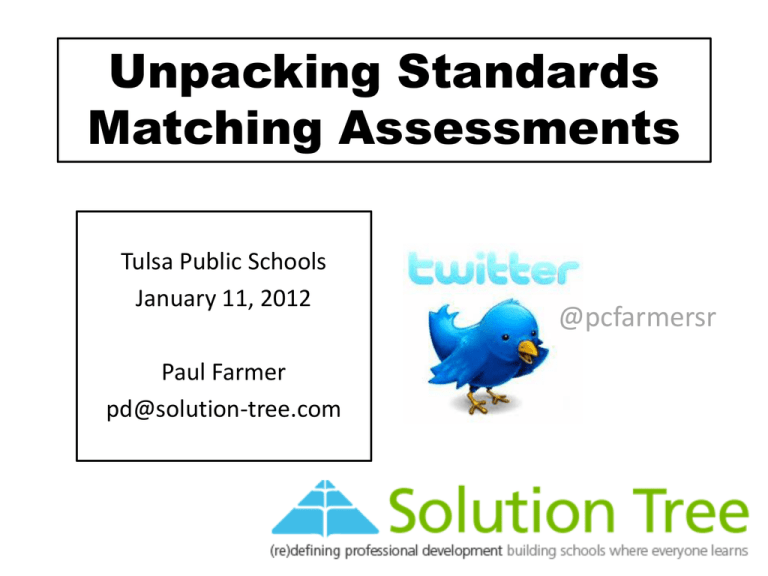
Unpacking Standards Matching Assessments Tulsa Public Schools January 11, 2012 Paul Farmer pd@solution-tree.com @pcfarmersr Agenda Professional Learning Communities 3 Big Ideas 4 Critical Corollary Questions You’ve got Mail! Identifying Essential Skills Unwrapping Standards Matching assessment methods with learned skills What are the Three Big Ideas of PLC at Work? 1. A Focus on Learning 2. A Collaborative Culture 3. A Focus on Results Essential Outcomes for January 11, 2012 • • • • • Discuss specifics of the 3 big ideas and 4 critical corollary questions in a PLC Learn an activity to engage stakeholders in problem solving Review criteria from Reeves and Ainsworth to identify essential skills Learn a process for unwrapping standards Complete an activity of matching assessments to essential skills First Big Idea Focus on Learning “The very essence of a learning community is a focus on and a commitment to the learning of each student” DuFour, DuFour, Eaker, & Many, 2010, Learning by Doing, Second Edition p. 11 Second Big Idea A Collaborative Culture “A PLC is composed of collaborative teams whose members work interdependently to achieve common goals for which members are mutually accountable” DuFour, DuFour, Eaker, & Many, 2010, Learning by Doing, Second Edition p. 11 Third Big Idea Focus on Rearning “Members of a PLC realize that all of their efforts must be assessed on a basis of results rather than intentions” DuFour, DuFour, Eaker, & Many, 2010, Learning by Doing, Second Edition p. 11 What are the Four Critical Corollary Questions? 1. What do we want our students to learn? (essential, guaranteed, and viable curriculum) 2. How will know they have learned it? (frequent, team-developed, common formative assessments) 3. How will we respond when they don’t learn it? (timely, directive, systematic intervention) 4. What will we do when they do learn it? (timely enriched content, extended activities) Identifying Essential Skills/Concepts 1. Gather necessary resources: – State standards – Association standards – District curriculum guides – Prerequisite skills – Assessment framework and blueprints – Other supporting documents and information 2. Review documents 3. Determine what is most important Identifying Essential Skills/Concepts • • • • • • • • • Essential skills/concepts must be aligned with district curriculum guides, state or national standards such as the Oklahoma Standards and Common Core Standards. Essential skills/concepts must be aligned with the association standards for courses such as Foreign Language, Family & Consumer Science, Music, Physical Education, etc… Students must be prepared to demonstrate proficiency with the essential skills/concepts on high-stakes tests. Learning of essential skills/concepts will be assessed frequently with teacher made common formative assessments for students to prove mastery and when necessary to allow for additional time and support to assure learning takes place. Teaching to the State Standards Recent research reveals that teaching to the state standards would require approximately 23 years. Determining What Is Essential 1. 2. 3. Endurance—Will this standard provide students with knowledge and skills that will be of value beyond a single test date? Leverage—Will this provide knowledge and skills that will be of value in multiple disciplines? Readiness—Will this provide students with the essential knowledge and skills necessary for success in the next unit, level of instruction, course, grade or level of instruction? DuFour, DuFour, Eaker, & Many Learning by Doing 2nd Ed, 2010, Page 65 Ainsworth , Rigorous Curriculum Design, 2010 Page 40 Reeves, The Leader’s Guide to Standards 2002, pp. 49–52 Consider one item your school has encountered as a hurdle for moving forward in the PLC journey. Create a description of the hurdle that would provide a reader with enough clarity to offer a meaningful suggestion. You’ve got Mail! 1. Each team writes their greatest challenge on the outside of the envelop (no names or other identifying information) 2. The second team reads the challenge and writes a suggestion for overcoming the challenge on one index card inside the envelop 3. The third and fourth teams read the challenge and the suggestion/s for overcoming the challenge then writes another suggestion 4. The postmaster redistributes the mail to the starting team with the challenge Skills / Concepts Learning / Achievement Targets Statements of what we want students to learn and be able to do. “The single most common barrier to sound classroom assessment is the teachers’ lack of vision of appropriate achievement targets within the subjects they are supposed to teach.” Rick Stiggins Knowledge / Understanding “Mastery of substantive subject content where mastery includes knowing it understanding it, and knowing how to find it.” Possible Verbs: Understand, describe, identify, define, label, match, choose, recall, recognize, select Adapted from Laurie Robinson 2011 Reasoning “The ability to use knowledge and understanding to figure things out and to solve problems” Possible Verbs: Explain, analyze,(support, determine, dissect, examine, order) Compare/contrast (discriminate, distinguish, find similarities and differences), Synthesize (blend, formulate, organize, adapt, modify) Classify (categorize, sort, group) Infer (interpret, conclude, predict) Evaluate (justify, support, appraise, debate, defend, evaluate, prove) Adapted from Laurie Robinson 2011 Performance Skills “The development of proficiency in doing something where it is the process that is important, such as playing a musical instrument, reading aloud, speaking in a second language, or using psychomotor skills” Possible Verbs: Observe, listen, perform, do, question, conduct, work, read, speak, assemble, operate, use, demonstrate, measure, investigate, model, collect, dramatize, explore Adapted from Laurie Robinson 2011 Products “The ability to create tangible products, such as term papers, science fair models, and art products, that meet certain standards of quality and that present concrete evidence of academic proficiency” Possible Verbs: Design, produce, create, develop, make, draw, represent, display, model, construct, build Adapted from Laurie Robinson 2011 Driving a Car With Skill • Knowledge • Reasoning • Skills • Products The Process of Unwrapping • • • • • • First, CIRCLE all of the verbs. What will students need to do? Second, UNDERLINE all the knowledge components that provide content. STAR any performance skills in the standard. BOX any products that will be required for standard completion. Below the standard, NAME any reasoning targets that are either explicit or implied. “Teachers who truly understand what they want their students to accomplish will almost surely be more instructionally successful than teachers whose understanding of hoped‐for student accomplishments are murky.” W. James Popham Assessment Methods and Effectiveness • Selected/Constructed Response • Multiple choice, true/false, matching, labeling of diagram, or short answer fill‐in items • Extended Written Response • An original written response • Performance • The ‘performance’ is the target • Personal Communication • Interview, conferences, oral examinations, class discussions Aligning Learning Targets to Assessment Methods Using the Target‐Method Match Activity: 1. Each person has a number 1 ‐ 4 2. Individually read through your assigned scenario and record your answer to each question by marking a “Y” in the appropriate box when your answer is “Yes.” Put an “N” in the box if the answer is “No.” 3. At your table or in your group discuss your answers for the ‘best’ matches. Unpacking Standards Matching Assessments Tulsa Public Schools January 11, 2012 Paul Farmer pd@solution-tree.com @pcfarmersr
